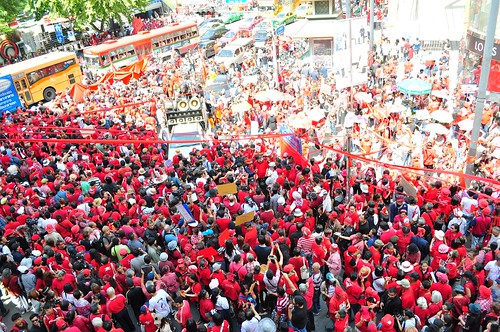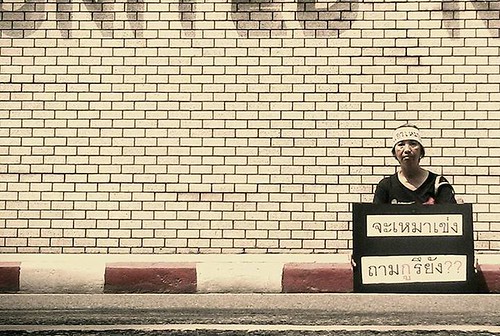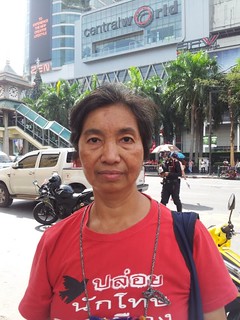Red-shirts' anti-blanket amnesty bill gathering at Bangkok commercial Ratchaprasong on Sunday, November 10, 2013.
“As soon as I heard from the TV news that the blanket amnesty draft bill was passed, my tears flowed spontaneously. I don’t usually cry for anything, but this bold move by Pheu Thai made me cry for two days running.”
Angry, disappointed and confused, Phussadee Ngamkham, wearing a black t-shirt, went to protest against the Pheu Thai Party-led government at Parliament House. “Don’t you care about my thoughts on the blanket amnesty?” read the placard of Phussadee, aka the Last Red Shirt. She said she was not sure who to vote for in the next general election.
Phussadee Ngamkham, holding placard "Don't you care my thoughts on the blanket amnesty?" in front of the United Nations Headquarter, on the way to the Parliament House on October 24, 2013.
Phussadee is one of the anti-establishment red-shirt supporters who feel betrayed by Pheu Thai for its attempt in early November to push for a blanket amnesty bill which aimed at granting an amnesty to all sides involved in the political conflict. The bill would have covered those responsible for the killing of red shirts during the military crackdown on the 2010 protests against the elite-backed Democrat government, Phue Thai de facto leader and self-exiled premier Thaksin Shinawatra, leaders of the red shirts and the pro-establishment protesters and red-shirt political prisoners arrested during the 2010 protests. The bill was hastily and inappropriately passed by the Lower House at 4 a.m. in the absence of opposition MPs.
The bold attempt by Pheu Thai to whitewash Thaksin by reconciling with the elite has strongly upset the red shirts, who every year have commemorated the bloody crackdown at the Ratchaprasong commercial district with angry messages such as “The bastard ordered the killing.”
It was after anti-Thaksin groups organized anti-amnesty protests, which have already escalated to anti-government protests, that Prime Minister Yingluck Shinawatra signalled in a televised address that the government would step back on the amnesty issue.
Prominent red-shirt figure Sombat Boonngamanong, apart from condemning the red-backed party, recently voiced his concern and confusion. “I’m having trouble now. I don’t know who to vote for and I don’t know what to do. It’s a crisis in life,” He said. “If there is an alternative political party which offers similar, or even better policies, I’d like to give it a try.”
At a recent red-shirt anti-amnesty gathering, the outspoken red shirt raised the idea of establishing a red-shirt party in order to better respond to the red shirts’ demands. Given that Pheu Thai is administered as a company owned by Thaksin, Sombat observed, it is very difficult for the party to heed its supporters’ advice and opinions. The mistaken move to push the amnesty bill was the result of this one-man-show administration, he added.
Sombat Boonngamanong, standing in the middle, talks about the idea of establishing a red-shirt party to his fellow red-shirts at the Red-shirts' anti-blanket amnesty bill at Bangkok commercial district Ratchaprasong on Sunday, November 10, 2013.
The idea of establishing alternative parties that offer policies not delivered by Pheu Thai is not a new phenomenon. The idea has been discussed by social movements which have never been successful in pushing for the amendment of laws that hinder human rights and freedom of expression.
Having worked with various social movements since his college years, Kittichai Ngamchaipisit, now 40 years old, has realized that social movements cannot really diminish social disparity without legislative change. “It was very difficult to enact constitutional amendments or draft bills. It’s nearly impossible,” said Kittichai. “A political party must be set up as another channel for social movements to use in mobilizing for change.”
The party, with a few red sympathizer activists as members, proposes to amend the lèse majesté law, promote land reform, and impose an inheritance tax. “We don’t want policies initiated by the elite which normally lack participation from commoners and never really benefit them,” said Kittichai.
Kittichai Ngamchaipisit (Photo courtesy of semsikkha.org)
Thitinan Pongsudhirak, political scientist from Chulalongkorn University in Bangkok, said it is a very good time for alternative political parties because both pro- and anti-establishment voters are dissatisfied with Pheu Thai and the Democrats at the moment.
But the academic observed that there are several factors that obstruct the growth of alternative parties. One important factor is the patron-client system, deeply rooted in rural Thai society.
Agreeing with Thitinan, Praderm Damrongcharoen, co-founder and former leader of the Farmer Network of Thailand Party, blamed farmer voters for clinging to their patrons and election canvassers. The party received almost 190,000 votes, which was not enough even to win a seat from the region-based party-list system in the 2007 general election. Praderm felt discouraged and resigned from the party.
However, this was the story before the 2007 charter was amended in 2011 to have only one constituency for proportional representation.
“Thanks to the coup makers-back 2007 constitution and the charter amendment in 2011, which removed the 5% threshold for party list representation, the door has been opened for small alternative parties to grow,” said Prajak Kongkirati, political scientist from Thammasat University. This is how the Rak Thailand Party, under the notorious massage parlour owner-turned-politician Chuwit Kamolvisit, won four seats in the 2011 general election from the proportional representation system. The charismatic Chuwit campaigned on a single issue which hit at the hearts of the Thai pro-establishment middle class -- the anti-corruption platform.
Prajak said alternative parties can follow Chuwit’s model by focusing exclusively on proportional representation and attracting its target voters with appealing platforms.
However, the chance of winning seats in the Lower House are still slim, Prajak said, because of the polarization of Thai politics. “Paradoxically, while it is very good timing for new parties because voters are hoping for alternatives, the main problem of Thai politics still remains that a group within the establishment is trying to overthrow the democratic system. This undemocratic force drives the pro-democracy camp to stay together despite differences.”
Wearing a red shirt again, Phussadee arrived at Ratchaprasong. “Free Political Prisoners,” read the text on her red t-shirt. She came to the gathering to speak out against the amnesty bill, but at the same time show her support for Pheu Thai.
Phussadee Ngamkhamm, aka the Last Red Shirt, at the red-shirts' anti-blanket amnesty bill on Sunday, November 10, 2013
After days of contemplation, the 58-year-old red shirt lady found a way to move on with Pheu Thai with less pain. “I felt down and angry because I thought Pheu Thai and the red-shirt movement were of one mind. While Pheu Thai was the left leg, the red shirts were the right leg. I later realized that we are actually separate entities. We are just friends who are walking on the same path. We may have some common points and some different.”
“Since there is a conflict between the people and the undemocratic invisible hands, calling for the resignation of the Pheu Thai government is inappropriate. An apology [from the Pheu Thai Party] is acceptable enough to me,” she added.
To be continued: A coalition model for alternative parties in polarized politics.










